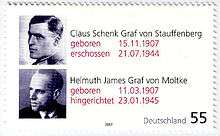Kreisau Circle
The Kreisau Circle (German: Kreisauer Kreis) was the name the Nazi Gestapo gave to a group of conservative German dissidents centered on the estate of Helmuth James Graf von Moltke at Kreisau, Silesia (now Krzyżowa, Poland). It is regarded as one of the main centers of German opposition to the Nazi regime. The difficulty for all such dissidents was how to reconcile patriotic loyalty to Germany with opposition to the Nazis, when the Nazis had subverted the state to such an extent that the two were almost inextricable.
Membership

The principal members were Helmuth James Graf von Moltke, Peter Graf Yorck von Wartenburg and Adam von Trott zu Solz. The leaders of the Kreisauer Kreis included members of some of the most illustrious names in German history. Helmuth James von Moltke was a great-grandnephew of the famous Field Marshal Helmuth von Moltke the Elder, who led the Prusso-German armies to victory over France in 1870. Peter Yorck von Wartenburg was a direct descendant of the Prussian general of the Napoleonic era who had been instrumental in arranging the defection of the Prussian army from the French side to that of the Sixth Coalition in 1813. General Yorck had been rewarded with title of Count, Graf von Yorck, and was allowed to append the name 'Wartenburg' to his surname as a battle honour.
Most members of the group were conservatives from the traditional German aristocracy and gentry, but the circle also included people from a wide variety of backgrounds. They included two Jesuit priests, two Lutheran pastors, conservatives, liberals, monarchists, landowners, former trade-union leaders and diplomats. They were united in their abhorrence of Nazism and their desire to conceive of a new, humane Germany after Hitler.
Objectives
The Kreisau Circle maintained contact with other resistance groups. Members of the circle worked to inform the Western Allies, especially the United Kingdom, about political conditions within the Third Reich and the dangers and weaknesses of Nazism. The circle's main focus was to plan and propose a peacetime government for Germany; they did not ever appear to have made any plans to overthrow the Nazi state. As Moltke wrote to his wife just before his execution "we are to be hanged for thinking together."
The long meetings and discussions at Kreisau developed a plan for society to be based on Christian values. Some of them also wanted to restore the German monarchy to prevent another dictatorship. Most wanted the regeneration of Germany after the end of Nazism to be based on Christian principles, for basic freedoms to be restored, and envisioned a Germany consisting of a federal state with a weak central government based on small self-governing communities,[1] so as to avoid a manipulation of the whole of society like the one Hitler had achieved.
Dissolution
On 19 January 1944 Moltke was arrested and the Kreisau Circle fell into disarray. The focus of some circle members had been turning towards an active political coup, and some participated in the failed assassination attempt on Adolf Hitler by Claus Schenk Graf von Stauffenberg on 20 July 1944. After the failure of this plot, many members of the Circle were arrested and executed. These included Trott but also members who had not been part of the Plot, such as Moltke, Yorck and Delp.
In popular culture
The 1996 television movie Witness Against Hitler starring James Wilby as Helmuth James von Moltke tells the story of the formation of the Kreisau Circle and the arrest, trial and execution of Moltke.[2] The Kreisau Circle resistance group is featured in the 2008 movie Valkyrie starring Tom Cruise. The movie focuses on a plot to assassinate Adolf Hitler in 1944. The Kreisau Circle also appears in the Wolfenstein games Return to Castle Wolfenstein, Wolfenstein, and The New Order as an extensive resistance network of paramilitary fighters and informants in Germany wanting to overthrow the Nazi regime.
See also
- Solf Circle (Frau Solf Tea Party)
- Category:Members of the Kreisau Circle
References
- ↑ Richard J. Evans (2008), The Third Reich at War, 1939-1945, Penguin, pp. 632–, ISBN 978-1-59420-206-3, retrieved 13 January 2013
- ↑ Witness Against Hitler at the Internet Movie Database
External links
- AIM25 archive of Kreisau Circle programmes at the British Library
- Heroes of the moral resistance against Adolf Hitler, The Times, January 5, 2010